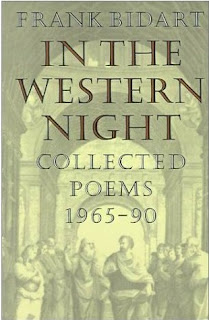Frank Bidart, In the Western Night, Stardust
 Although I have a different overall opinion, I may as well start out with this quote from a review by Sven Birkerts, collected in his book The Electric Life: Essays on Modern Poetry:
Although I have a different overall opinion, I may as well start out with this quote from a review by Sven Birkerts, collected in his book The Electric Life: Essays on Modern Poetry:Reading Frank Bidart's poems, I react at first a bit the way that dancer reacted to her role: I do not 'like' them. They do not make use of the sonorous properties of the English language, they do not incorporate the poetic tradition in any obvious way, they avoid the concentrating power of metaphor, they offer none of the tensing satisfactions of meter, and, finally, they seize and explore only what is most frightening, wounded, and compromised in our souls.I suppose it is difficult to say one likes Bidart's poetry in the same sense one says one likes Rilke, and especially not in the same sense one might say one likes Billy Collins. Bidart eschews the sorts of charms that either possess—his work is self-effacing in a way that threatens (unlike Collins's avuncular deprecations of poetry and/or himself) and passionate in a way that alienates (quite counter to Rilke's very engaging forms of passionate address). Furthermore, it is impossible to identify with or even know Bidart through his poems in the way we think we know Plath or Lowell through their confessional lyrics, even though they too threaten us with their self-effacements and alienate us with their passionate intensity.
But these are historical comparisons, a method of bracketing Bidart by oppositions within the history of twentieth-century poetry. To proceed this way is to assert a uniqueness for Bidart which is, in the end, trivial. No one of stature shares his particular poetic traits or temperament. And?
A thematic reading of Bidart is similarly nugatory; after reading a handful of his major poems—the extant parts of the ongoing Hours of the Night sequence, "The War of Vaslav Nijinsky," "Ellen West," "Confessional"—one can make a perfunctory and quite likely accurate checklist of his major themes, preoccupations and tropes. (Or one could read this or the Birkerts essay mentioned above.) And if nothing else, Bidart speaks very explicitly about his method, his themes, and their history in a very good interview appended to the poems in In the Western Night.
What is left for me to say then? When one talks about poetry, one typically discusses the themes or character of the work, but Bidart is so definite about both that it seems superfluous to belabor them. Which is not to say his themes and the formal means by which he expresses them are facile or obvious, but rather that the effects and themes I could describe in this space are visible, and readily so, and while there is much more complexity and philosophical depth to them, discussion of this depth would not be well served by a blog post.
If I were to make one comparison, it would be to Blake, whose themes and effects are also readily picked up by merely looking at the page, and yet whose complexity—even in metrically and lexically simple poems like "The Tyger"—can swallow dissertations whole. Like Blake, there is a charge of intellectual challenge and adventure in Bidart's work made more enticing and thrilling by the fact that the poems are so obviously predicated on struggle and force, and that in that predication is offered to you the terms and intensity of your experience with the poems.
While Blake, however, expresses this struggle and the terms of its reading in primarily visual terms, Bidart is only secondarily visual—of primary importance is the voice, and it is the reader's main objective to hear the voice of the poem in a way that resonates with its appearance on the page. The elements which are most indicative of Bidart's creative force and agenda—the capitalization, scattered alignments, double punctuations, italics—are those which are meant to convey most directly the sense of an active voice but which most obviously point to the presence of a passive eye. The ensuing struggle for supremacy (or primacy) of eye and ear is the soul of Bidart's poetry.
This is, however, one of those obvious things I said I wouldn't write about, so I'll stop to encourage you to discover the others for yourselves.
Comments